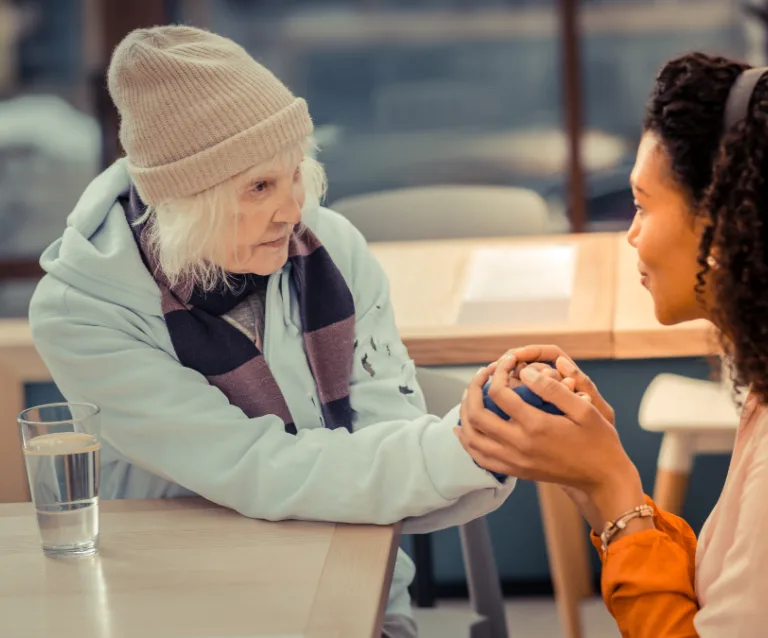Menu

The 2030 Agenda for Sustainable Development, established by the United Nations in 2015, outlines 17 Sustainable Development Goals (SDGs). These goals, through cooperative international efforts, aim to achieve a better planetary future across sectors including health, infrastructure, finance, environment, and equality. The emergence of the COVID-19 pandemic has posed obstacles to achieving these goals by 2030. Four experts in global health are making the case that embracing compassion has the potential to revive and expedite progress towards the SDGs, ultimately fostering human flourishing.
Key takeaways:
Compassion as a Dynamic Force
Heather Buesseler, MPH, Senior Compassion Adviser at The Task Force for Global Health (TFGH)’s Focus Area for Compassion and Ethics (FACE) explains that the SDGs "recognize planetary and human suffering and articulate how it shows up in the world," including as poverty, as disease, and as inequities. David Addiss MD, MPH is Global Health Ethics Officer and Director at TFGH, and founding director of FACE. He believes that compassion is inherent in the SDGs, and that compassion should be centered in every discussion and decision about how the SDGs are met. "I see the Sustainable Development Goals as an expression of compassion and an attempt to deliver compassion in very tangible forms to alleviate specific forms of human suffering," he says.
"Contrary to the popular view that compassion is just about warmth, I think it really gives you a clear-eyed focus on what needs to be done," says Dr. Corinne Reid, Professorial Fellow at the Global Health Academy at The University of Edinburgh. She contends that compassion is an "activating force" that can "drive us to think outside of ourselves and our own needs for long enough to see through a commitment to a challenge of global scale in the way that is required for the SDGs." Addis echoes this idea, and adds "I see compassion more as the engine, the motivation, the source, than as a particular tool."
Liz Grant MA PhD, FRSE, FRCPE, MFPH, Assistant Principal and Professor of Global Health and Development at The University of Edinburgh emphasizes that "compassion isn't pity. Compassion isn’t just kindness or being nice." She follows Monica Worline and Jane Dutton's definition of compassion, which Grant explains as, "a four-part process: being able to notice suffering, to interpret it, to understand what is driving the suffering, why does it happen, and then this fourth component, to take action to alleviate suffering." Grant notes, "I am very happy with that definition of the four parts, because I think it creates that sense of movement, adding into it the essence of being together. Often we can focus on the suffering, but forget that the art of compassion is working together with, as opposed to doing to people or speaking at people or trying to help. It’s about being together to make a change."
Empathy Plus Action
Buessler and Addiss remind us that empathy is key. "Can we see ourselves in another's shoes and how it affects them and relate to it ourselves," asks Buessler. "In different disciplines, and even within disciplines, there are different definitions of compassion. One way of looking at compassion is it's a human response to suffering that seeks to alleviate that suffering. You could call it empathy plus action, action to alleviate suffering. I also think of compassion as what love does in the presence of suffering," says Addiss.
Buesseler agrees and notes, despite variations in definition, "the most important step when it comes to compassion is taking action. This is what the SDGs are doing. They've outlined the goals, the actions that we need to take in order to alleviate that suffering. For these reasons, this is how we are really moving forward and re-centering compassion within global health, which is also a discipline that really identifies suffering in the world and is taking actions in order to alleviate it."
Compassion in Action Case Studies #compassion4theSDGs
Addiss, Buesseler, Grant, and Reid have made a public case for compassion to be centered in the remaining years of work to reach the SDGs before 2030. They collaborated on "A compassion narrative for the Sustainable Development Goals: conscious and connected action,” which was published in the medical journal, The Lancet, in summer 2022. They have launched a social media campaign emphasizing the integral nature of compassion in the SDGs through an examination of individual SDGs (released on relevant "world days") and case studies. Follow the #compassion4theSDGs hashtag on the most well known social media platforms.
Built upon the award-winning video series of the same name, Templeton World Charity Foundation’s “Stories of Impact” podcast features stories of new scientific research on human flourishing that translate discoveries into practical tools. Bringing a mix of curiosity, compassion, and creativity, journalist Richard Sergay and producer Tavia Gilbert shine a spotlight on the human impact at the heart of cutting-edge social and scientific research projects supported by TWCF.